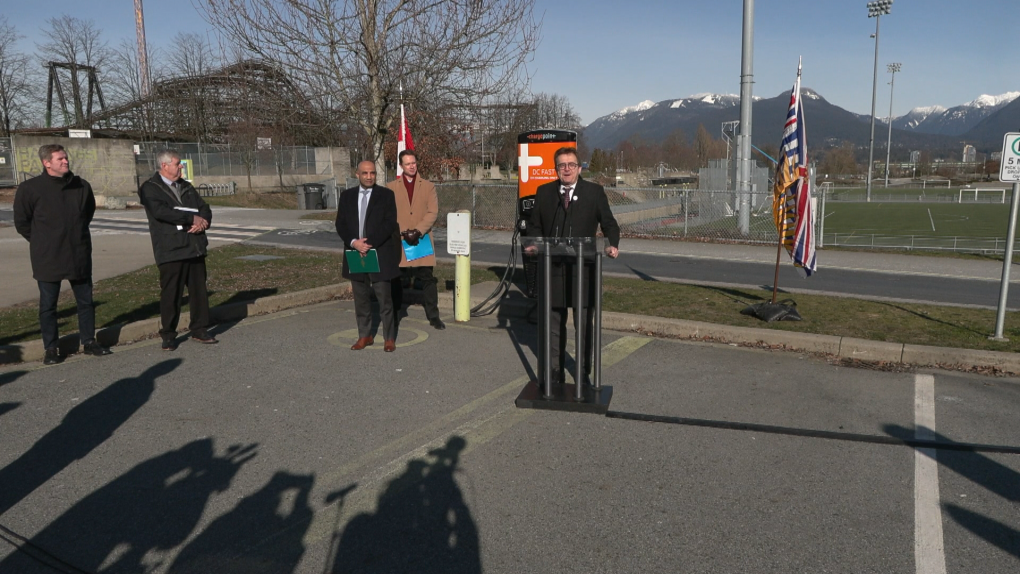Nearly 2,400 EV chargers to be installed in B.C., with most slated for Greater Vancouver
 Jonathan Wilkinson, Canada's natural resources minister, announced nearly $19 million in federal funding to support the installation of more than 2,400 electric vehicle chargers across B.C. on Feb. 24, 2023. Greater Vancouver is where the majority of new stations are slated to be installed. (CTV)
Jonathan Wilkinson, Canada's natural resources minister, announced nearly $19 million in federal funding to support the installation of more than 2,400 electric vehicle chargers across B.C. on Feb. 24, 2023. Greater Vancouver is where the majority of new stations are slated to be installed. (CTV)
Canada's government is investing nearly $19 million to make driving electric vehicles more accessible across British Columbia.
The federal funding will go towards installing close to 2,400 additional electric vehicle chargers — most of which will be installed in Greater Vancouver, the minister of natural resources announced Friday morning.
“These chargers will make it so much easier for drivers to get to where they need to go and to reduce range anxiety, which was something that inhibited the deployment of vehicles for a number of years,” Jonathan Wilkinson said during a news conference at a charging station in East Vancouver.
Wilkinson says that anxiety is slowly going away through initiatives like Natural Resources Canada’s Zero-Emission Vehicle Infrastructure Program (ZEVIP), as well as its Electric Vehicle Infrastructure Program.
A total of 26 projects province-wide — led by municipalities, multi-residential buildings, businesses and utilities – will benefit from the federal investment, according to Natural Resources Canada.
ZEVIP is a $680-million initiative that aims to ramp up the number of localized charging and hydrogen refueling options across Canada, and is set to end in 2027.
Meanwhile the EVID program’s objective is to support the development of innovative clean energy infrastructure.
To date, the federal government has invested more than $1 billion to support increased adoption of zero-emission vehicles.
During Friday’s announcement, Wilkinson commended British Columbia for having the highest rates of electric vehicle uptake in the country, which he says is largely due to support from Ottawa and the provincial government.
Through the CleanBC Go Electric program, for example, the province has committed more than $288 million in funding to support ZEV adoption since 2011.
On Friday, B.C.’s government provided an additional $2.2 million for the installation of public chargers.
“There’s going to be a lot more partnerships like this in the future,” Wilkinson said, laying out two paths Canada can take while fighting climate change.
“One in which we have an effective and thoughtful plan for the future, embracing the economic opportunities that come with building a prosperous low-carbon economy and leaving a healthy planet for our children and our grandchildren,” Wilkinson said.
The other option, according to the minister, is for Canada to hope for the best and allow competitors to seize those opportunities instead, resulting in future generations growing up in a much more challenging environment.
“Your federal government has chosen the former, and we want to work with you every step of the way,” Wilkinson said.
CTVNews.ca Top Stories

Trudeau's 2024: Did the PM become less popular this year?
Justin Trudeau’s numbers have been relatively steady this calendar year, but they've also been at their worst, according to tracking data from CTV News pollster Nik Nanos.
Manhunt underway after woman, 23, allegedly kidnapped, found alive in river
A woman in her 20s who was possibly abducted by her ex is in hospital after the car she was in plunged into the Richelieu River.
Death toll in attack on Christmas market in Germany rises to 5 and more than 200 injured
Germans on Saturday mourned both the victims and their shaken sense of security after a Saudi doctor intentionally drove into a Christmas market teeming with holiday shoppers, killing at least five people, including a small child, and wounding at least 200 others.
Overheated immigration system needed 'discipline' infusion: minister
An 'overheated' immigration system that admitted record numbers of newcomers to the country has harmed Canada's decades-old consensus on the benefits of immigration, Immigration Minister Marc Miller said, as he reflected on the changes in his department in a year-end interview.
Wild boar hybrid identified near Fort Macleod, Alta.
Acting on information, an investigation by the Municipal District of Willow Creek's Agricultural Services Board (ASB) found a small population of wild boar hybrids being farmed near Fort Macleod.
Summer McIntosh makes guest appearance in 'The Nutcracker'
Summer McIntosh made a splash during her guest appearance in The National Ballet of Canada’s production of 'The Nutcracker.'
The winter solstice is here, the Northern Hemisphere's darkest day
The winter solstice is Saturday, bringing the shortest day and longest night of the year to the Northern Hemisphere — ideal conditions for holiday lights and warm blankets.
Back on air: John Vennavally-Rao on reclaiming his career while living with cancer
'In February, there was a time when I thought my career as a TV reporter was over,' CTV News reporter and anchor John Vennavally-Rao writes.
It's eggnog season. The boozy beverage dates back to medieval England but remains a holiday hit
At Scoma's Restaurant in San Francisco, this holiday season 's batch of eggnog began 11 months ago.
































